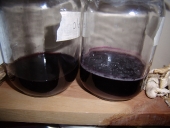Hi Kate! Cheese and now sourdough, hooray and thank you!
I've been doing the sourdough bread dance every week for several years now, but still have much to learn. My goal was always to be able to bake like my ancestors, without a scale, without analyzing hydration, just by my hands in the dough. But first I had to learn the basics. I delved deep into recipes and forums and measured every last particle to the gram like the experts said you must. For years. Technical and intimidating, both.
Once I started getting comfortable with that process, I wanted whole grain that I milled at home, not the shelf-stable stuff on grocery shelves. Fresh-milled flours perform quite differently, and 100% whole grain is harder to make lofty. My loaves went from wondrous to wonky.
Every layer of this process that I uncover, there is another beneath. I am only just getting to a place where I can make a delicious intuitive whole grain bread (no measuring of flour, starter, water or salt). Though I have yet to make a whole grain loaf that rises to the heavens like that sifted shelf stuff.
Still - years later, the number one hardest thing is the timing of it all, and fitting that into a life chock full of other demands. Now that I'm using fresh-milled flours, I am soaking them anywhere from 4-12 hours prior to adding starter. It makes a difference, but is an added time constraint that takes my bakes to three days of process.
Even without the soaking, it's a long haul, the timing of which is dictated by your wee sour-inducing beasties, not you.
How then, to not be held hostage by your bread baking schedule? My dream sourdough baking book would contain tips and tricks for just that.
As an example - and this is something I've never read in any book or forum, but I recently learned (out of necessity, as midnight came and went) it's possible to retard (refrigerate) your dough during bulk ferment instead of the traditional final proof, if your life blows up and you can't keep waiting on it. The bread that emerged from this reverse process, was excellent. That was a freeing lesson!
In hindsight I think it is so much more important to have a good understanding of the science and why bakers do all those technical moves, the secret lives of yeast and bacteria. That good understanding will allow us novice bakers to pivot, explore, make it more of a creative process than simply following another’s route.
You’ve nailed all my issues - the perfection and analysis paralysis is real too. But I’d tell my early baking self that sourdough is like the rest of life, you can’t let fear of messing up stop you. And I would never have believed this in the beginning, but I’ve eaten every single one of my failed lumpy brick-like loaves, and loved them. Eat your failure! You might be surprised at how delicious it is. It’s fun, too. I look forward to reading your work!









